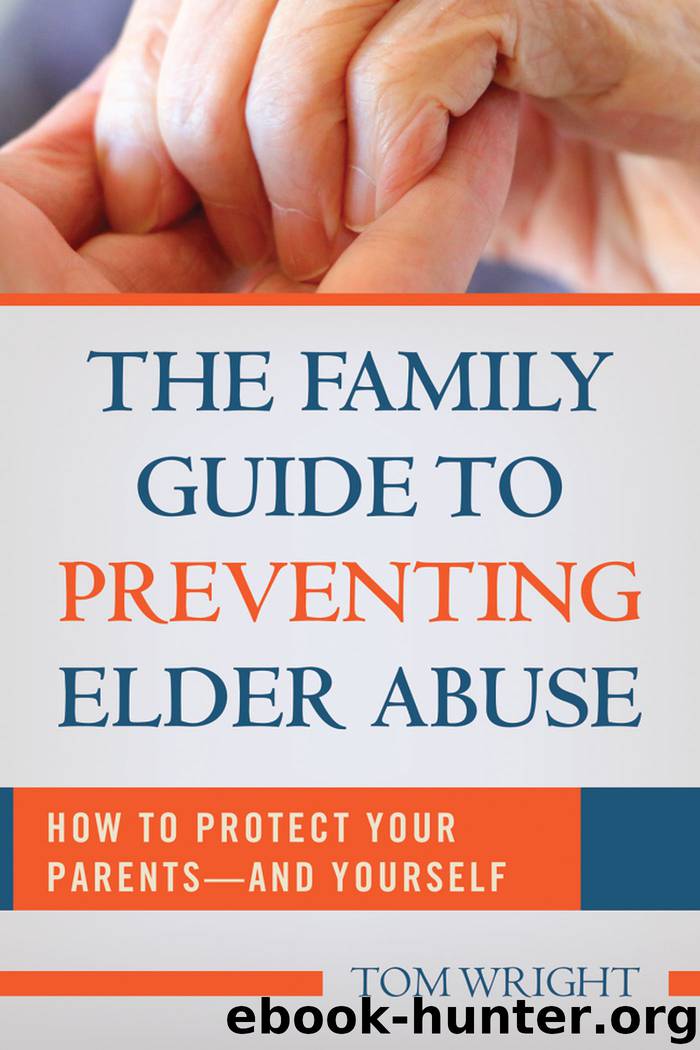The Family Guide to Preventing Elder Abuse by Thomas Lee Wright

Author:Thomas Lee Wright
Language: eng
Format: epub
Publisher: Skyhorse Publishing
Published: 2017-03-15T04:00:00+00:00
The Role of the Physician
Due to their prescribed roles and the fact they see your loved one on a regular basis, physicians can play a critical role in identifying, treating, and preventing abuse and neglect in institutional settings or in the independent-living environment of the home. When it comes to a group environment, state laws require that patients be admitted by physicians to nursing homes (and, in some cases, to other types of residential facilities). After admission, each resident’s care must be under the supervision of an attending physician (or a physician assistant, nurse practitioner, or clinical nurse specialist supervised by a physician), and facilities are mandated to provide them immediate access to their patients.
Several of their prescribed roles make personal physicians more likely to recognize and prevent the institutional abuse and neglect of our loved ones. These roles can include:
• Participating in the development and monitoring of your parent’s plan of care
• Assessing the need for and prescribing drugs only when appropriate for treatment of a particular condition, and not for behavioral modification or control
• Monitoring reports that by law must go to the physician, including any irregularities in drug regime as found by the pharmacist who conducts a regular drug regimen review of all patients
Whether a vulnerable elder lives independently or in a home, personal physicians can play a crucial role in the identification and prevention of mistreatment by ongoing monitoring of a patient’s health through regular physical exams, review of the patient’s record, and review of assessments by others like medical specialists.
Assessments must be completed annually, with updates quarterly and whenever there is a significant change in the patient’s condition.
Documentation
Thorough, well-documented medical records are essential. You should help your physician to keep records by taking meticulous notes yourself and maintaining copies of both the doctor’s notes and your own. Records should be kept in a precise, professional manner and should include the following:
• Chief complaint and description of the abusive event or neglectful situation, using the patient’s own words whenever possible
• Complete medical history
• Relevant social history
• A detailed description of injuries, including type, number, size, location, stages of healing, color, resolution, possible causes, and explanations given
• Where applicable, the location and nature of the injuries should be recorded on a body chart or drawing.
• An opinion on whether the injuries were adequately explained
• Results of all pertinent laboratory and other diagnostic procedures
• Color photographs and imaging studies, if applicable
• If the police are called, the name of the investigating officer and any actions taken
In addition to complete written records, photographs are particularly valuable as evidence. The physician should ask your parent for permission to take photographs. When your parent is unable to give consent, photographs may be taken and a surrogate decision-maker (such as yourself) may need to be consulted after the fact. Imaging studies also may be useful. State laws that apply to the taking of photographs usually apply to X-rays as well.
Legal Considerations
The first priority of the physician when mistreatment is detected or suspected is to assure the safety of the victim.
Download
This site does not store any files on its server. We only index and link to content provided by other sites. Please contact the content providers to delete copyright contents if any and email us, we'll remove relevant links or contents immediately.
| Anthropology | Archaeology |
| Philosophy | Politics & Government |
| Social Sciences | Sociology |
| Women's Studies |
The Secret History by Donna Tartt(19088)
The Social Justice Warrior Handbook by Lisa De Pasquale(12190)
Thirteen Reasons Why by Jay Asher(8909)
This Is How You Lose Her by Junot Diaz(6886)
Weapons of Math Destruction by Cathy O'Neil(6279)
Zero to One by Peter Thiel(5801)
Beartown by Fredrik Backman(5754)
The Myth of the Strong Leader by Archie Brown(5507)
The Fire Next Time by James Baldwin(5444)
How Democracies Die by Steven Levitsky & Daniel Ziblatt(5218)
Promise Me, Dad by Joe Biden(5153)
Stone's Rules by Roger Stone(5087)
A Higher Loyalty: Truth, Lies, and Leadership by James Comey(4962)
100 Deadly Skills by Clint Emerson(4925)
Rise and Kill First by Ronen Bergman(4788)
Secrecy World by Jake Bernstein(4753)
The David Icke Guide to the Global Conspiracy (and how to end it) by David Icke(4717)
The Farm by Tom Rob Smith(4507)
The Doomsday Machine by Daniel Ellsberg(4490)
